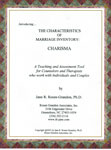Featured Products
The Characteristics of Marriage Inventory... CHARISMA at a Glance
NORMS
CHARISMA, the Characteristics of Marriage Inventory, was developed to assess both the importance of marital characteristics to married individuals and their satisfaction with those characteristics in their marriages. CHARISMA was administered to 201 married individuals and found to have acceptable reliability and validity as well as clinical utility for helping couples examine their relationship values and priorities. Since the initial research which developed this instrument, it has proved useful … as a therapy tool in clinical counseling practice, as a framework for the treatment plan in marital counseling/therapy, and as an approach to marital education.
Developed in 1998, the CHARISMA is new to the field of marriage assessment devices. However, since its inception, it has already been used in the study of arranged marriages in the country of India (Madathil, J. & Myers, J.E., 2000). Due to the verbal simplicity of this inventory, it is easily translated into other languages and lends itself well to cross-cultural studies of marital satisfaction.
TARGET AUDIENCES
While the CHARISMA speaks directly to marriages, it is equally useful to individuals, and is pertinent to both married and unmarried couples. It can be used as a tool to evaluate current relationships, to gain a better understanding of previous relationships, or to clarify desired characteristics of a future relationship. In most cases, the term “spouse” is used in place of the terms “husband” and “wife”, in recognition of couples who subscribe to different lifestyles and definitions of their gender roles.
The CHARISMA Inventory can easily be used within the context of individual counseling or couple counseling. When used in couples counseling, partners gain insight into their own value systems as well as the value system of their mates. Additionally, this instrument may be used to identify areas of satisfaction and dissatisfaction within the relationship, and informed of specific marital interaction processes that strengthen each area.
SCALES
Two scales assess the unique viewpoints of the individual spouses: Importance and Satisfaction. Using identical lists of 18 marital characteristics, the first scale asks, How Important is this marital characteristic to you? The Satisfaction scale inquires, How Satisfied are you with each of these 18 marital characteristics in your relationship?
A difference score is computed by subtracting each satisfaction score from its counterpart importance rating. Any negative difference scores suggest that an individual is not as satisfied as they would like to be.
CONSTRUCTS
The CHARISMA Inventory can be completed in 5 minutes and scored in 5 minutes, leaving the balance of time for discussion of results within a single therapy session. The entire Inventory contains only 37 items. Participants rate each of the 18 marital characteristics using a six-point Likert-type scale twice: first, to measure the importance of marital characteristics and second, to measure one’s satisfaction with those characteristics. A final question asks for a global rating of one’s marital satisfaction.
RELIABILITY AND VALIDITY
The internal consistency of each subscale was measured using Cronbach’s alpha coefficient. The alpha for the Importance scale was .83 and the alpha for the Satisfaction scale was .94. Concurrent validity of CHARISMA was established in relation to the Spanier’s Dyadic Adjustment Scale (1976) and the ENRICH (Olson, McCubbin, Barnes, Larsen, Muxen, & Wilson, 1983). Both instruments have been widely used in both research and clinical work related to marital satisfaction.
FACTOR ANALYSIS AND STRUCTURAL EQUATION MODELLING
State of the art statistical methods were used to identify three factors (pathways) which influence marital satisfaction: Satisfaction with Love, Loyalty, and Shared Family Values. Relationships were identified between these pathways and 6 marital relationship skills: communication, Affection, Sexuality, Decision-Making, Role Satisfaction, and Conflict Management.


